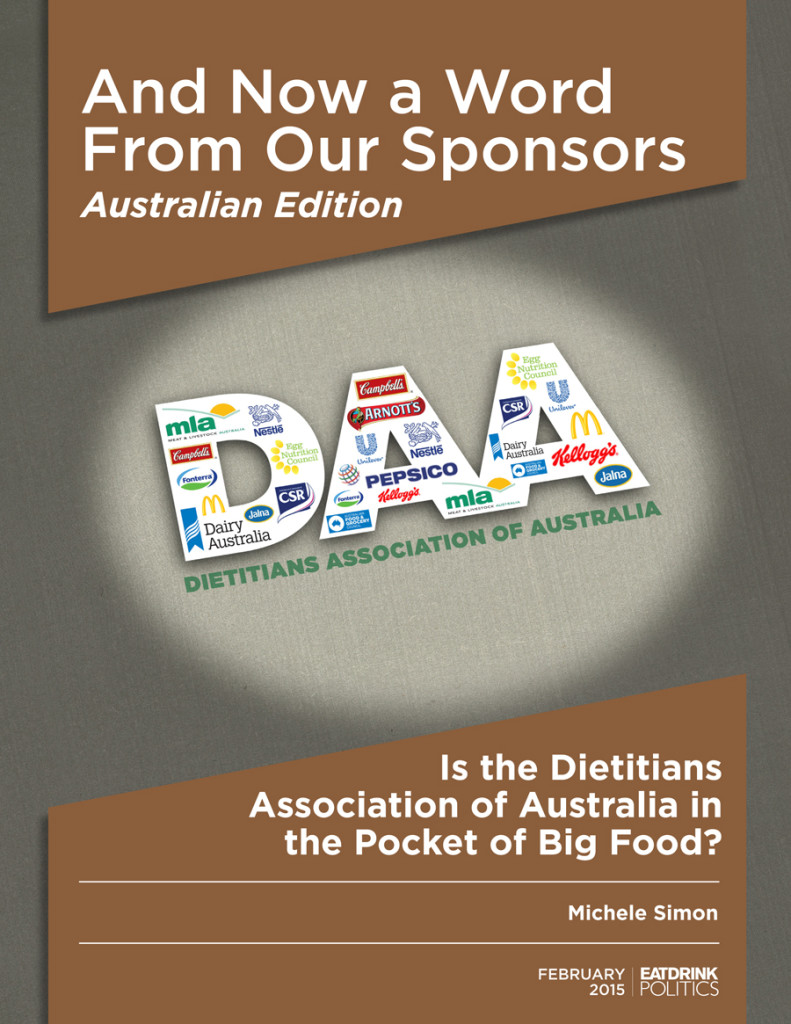New Report from Eat Drink Politics Exposes Conflicts of Interest in Australian Dietitians Group
 Just as most western nations do, Australia suffers significantly from diet-related chronic diseases. Heart disease is the leading cause of death, killing one Australian every 12 minutes. Diabetes is also a serious health concern, with rising rates in recent years, according to the government.
Just as most western nations do, Australia suffers significantly from diet-related chronic diseases. Heart disease is the leading cause of death, killing one Australian every 12 minutes. Diabetes is also a serious health concern, with rising rates in recent years, according to the government.
The 2013 report, “And Now a Word from Our Sponsors,” also from Eat Drink Politics, found that the Academy of Nutrition and Dietetics in the United States has a serious credibility problem due to its myriad conflicts with the junk food industry. Sadly, a very similar situation exists within Australia’s dietetic profession, led by the Dietitians Association of Australia. Among the most troubling findings of the new report from Eat Drink Politics:
- Corporate sponsors of DAA include Meat and Livestock Australia, Nestlé, Unilever, Dairy Australia, and the Egg Nutrition Council
- Meat and Livestock Australia is a sponsor of DAA’s “Australia Healthy Weight Week”
- Nestlé Nutrition Institute funds the DAA “Emerging Researcher Award”
- DAA was a partner in the “Nestlé Choose Wellness Roadshow”
- McDonald’s and the Australian Heart Foundation promoted free “Deli Choices Wraps” at DAA’s annual meeting
- DAA “In the Spotlight” dietitians include the director of communications and public affairs at Kellogg’s and the nutrition manager for PepsiCo Australia* (see note below)
- DAA spokesperson Alan Barclay published disputed data claiming lower sugar consumption during rising obesity rates (“the Australian Paradox”) and was paid by Coca-Cola to present his research
- DAA Director Leigh Reeve (board member) is also the director of the Australian Breakfast Cereal Forum of the Australian Food and Grocers Council
- DAA’s policy to not endorse specific products is violated on the organization’s own Pinterest pages, which frequently display recipes from corporate sponsors with branded products
- A dietitian was deemed “not eligible” for her earned credential by DAA, allegedly for speaking out against these sorts of conflicts of interest.*
Lucy Taylor is a dietitian specializing in plant-based diets practicing in Melbourne. She is not happy with her chosen profession’s leadership:
As a dietitian, I feel like I’m forced to be a mouthpiece for a the food industry. I object to being fed masses of industry-funded ‘research updates’ with messages that I am supposed to work into my practice such as, eat red meat 3 times a week from Meat and Livestock Australia, or consume 3 servings of dairy per day from Dairy Australia. The worst is from the food companies themselves, like Coca Cola telling me how wonderful their calorie-controlled smaller cans are.
Melanie Voevodin is the dietitian whose name is being tarnished on the DAA website, she says because she dared to speak out. She plainly sees how such conflicts damage the entire profession:
Each individual dietitian bears the public scrutiny of the actions of the DAA and their continued financial relationships with the food industry and their front groups despite the evidence of a conflict of interest. That conflict exists whether real or perceived, whether denied, acknowledged or managed. As long as DAA maintains these financial relationships, every individual dietitian will bear the public scrutiny. It is therefore reasonable to suggest DAA is now the single greatest barrier to the credibility of the profession.
What is the role of the Dietitians Association of Australia—the nation’s largest organization of nutrition professionals—in preventing or at least stemming the tide of diet-related health problems? It’s high time for this organization to look inward. The health of all Australians depends upon the independence of the nutrition profession and its leadership’s ability to be the nutrition leaders they claim to be, free from sponsorship money.
In the aftermath of my report on the U.S. Academy of Nutrition and Dietetics, a group of RDs formed “Dietitians for Professional Integrity” to protest AND’s sponsorship conflicts, and continues to maintain a Facebook page with 11,000 likes. Perhaps it’s time for an international coalition to protest professional conflicts in Australia and globally.
Download the full report here.
*Corrections: The report mistakenly refers to these two dietitians as DAA spokespeople when instead DAA features them on its website under “In the Spotlight“. I have also reworded parts of this post to reflect DAA’s position regarding Melanie Voevodin.
Update: DAA’s CEO Claire Hewat wrote this letter in response. Other than the above correction, I stand by the report. The letter ignores the main critique: that conflicted sponsorships tarnish the profession and harm public health.


















